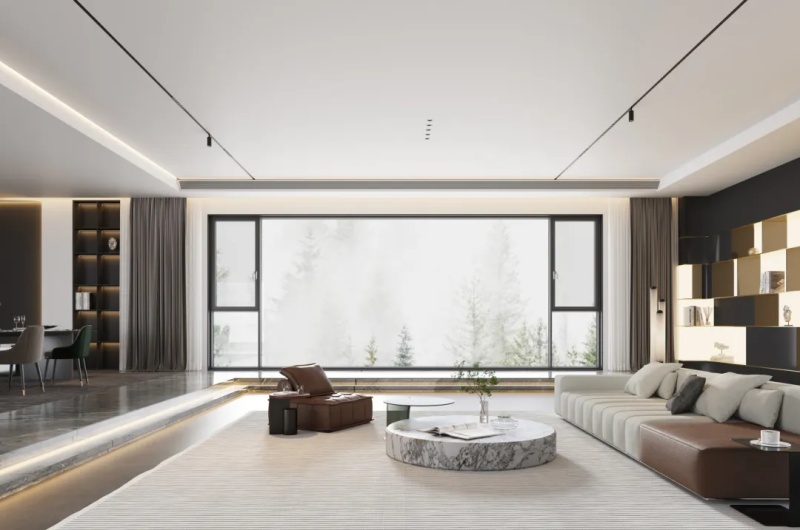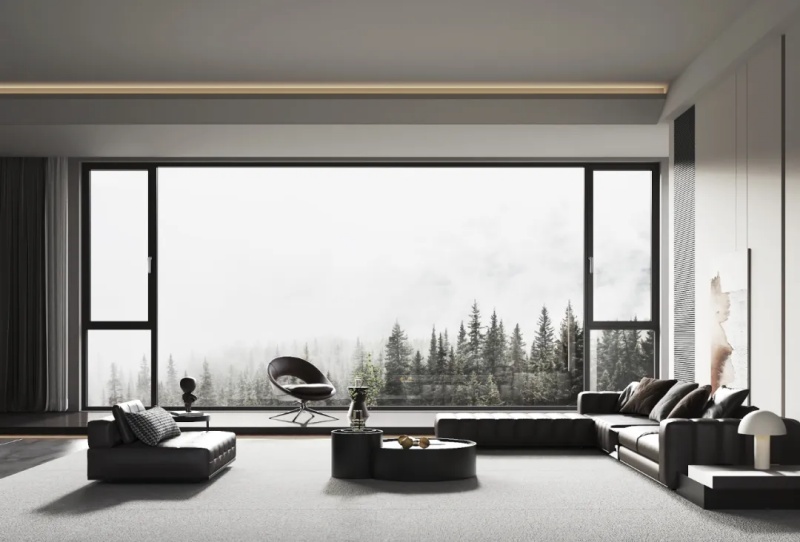

"Why are the system doors and windows that cost tens of thousands of dollars still not soundproof?"
Many owners often pay too much attention to profiles and hardware when sealing balconies and choosing windows, but ignore glass. You know, glass occupies 85% of the entire window area, and choosing the wrong glass will not only affect the sound and heat insulation effect, but also bring safety hazards or affect living comfort. The following glass buying guide will help you spend your money on the blade.
Basic: double-walled insulating glass
The most common configuration on the market is usually a combination of two 5mm thick monolencular glass (e.g., 5mm + 27A + 5mm) filled with argon in the middle
01 performance
It can effectively improve the insulation and thermal insulation performance, and also has a certain isolation effect on medium and high frequency noise (such as human voices and horn sounds).
02 Scope of application
It is suitable for most ordinary residential environments, can meet daily basic needs, and is a cost-effective standard choice.

On-demand upgrades: glass configurations for different needs
However, every home is different, and if your home has different needs, we recommend that you take a look at the following glass configurations:
#1 Street frontage/elevated/airport/railway
Recommended choice: laminated glass
By adding one or more layers of organic polymer interlayer between two or more pieces of glass, and treating it with a special high-temperature and high-pressure process, the interlayer and glass are permanently bonded together, and this composite glass product - laminated glass can be made. Laminated glass also has a good sound insulation effect, and is often used in residences with strong penetrating low-frequency noise such as trains, airplanes, and car engines.
Configuration Recommendations: Depending on noise severity, selectable
Single-sided laminated insulating glass: balancing sound insulation with cost.
Double-sided laminated insulating glass: provides enhanced sound insulation, especially suitable for extreme noise environments.
#2 Coastal/strong wind area/severe west sun
Recommended choice: Low-E glass
Low-E glass, also known as low-emissivity glass, is a film product composed of multiple layers of metal or other compounds coated on the surface of glass. Its coating has the characteristics of high transmission of visible light and high reflection of mid and far infrared rays, so that it has excellent thermal insulation, thermal insulation effect and good light transmittance compared with ordinary glass and traditional architectural coated glass.
Core role: thermal insulation, UV protection
In summer, it effectively reflects solar infrared heat energy, reduces indoor heat ingress, and reduces the air conditioning load. In winter, reduce the loss of indoor heating energy and maintain the indoor temperature to achieve a more comfortable "warm in winter and cool in summer".
#3 Severe cold areas in the north
Recommended choice: three-glass two-chamber / four-glass three-chamber
More thermal barriers are created by increasing the number of glass layers (three or four layers of glass) and air cavity layers (two or three).
Core function: ultimate heat preservation, reduce energy consumption
It greatly reduces indoor and outdoor heat conduction, and its thermal insulation performance far exceeds that of double-layer insulating glass, which is especially suitable for the northern region with long and cold winters, effectively reducing heating energy consumption.
#4 I want to make oversized glass (such as oversized floor-to-ceiling windows).
Recommended choice: ultra-white glass
Ultra-white glass, also known as "low-iron glass", has an iron content of only 1/10 or even lower than ordinary glass. This almost colorless pure texture makes it an excellent medium for light to spread, whether it is the first ray of sunlight at dawn or the last glow of the setting sun, it can pass through the glass almost indestructively, casting the truest color on the wall.
Core advantages: improve home safety and daylighting rate
Extremely low self-detonation rate: The content of impurities (nickel sulfide, etc.) inside ultra-white glass is extremely low, which significantly reduces the risk of self-explosion and is safer than ordinary glass, which is especially important for large-area glass.
High light transmittance: purer colors, better transparency, almost no green light, and clearer vision.
#5 Insufficient lighting (e.g. north-facing rooms, dark bathrooms, small apartments)
Recommended choice: ultra-white glass
Thanks to its extremely high light transmittance, it can maximize the introduction of natural light, effectively improve the overall brightness and transparency of the room, and improve the oppressive feeling of light-weak spaces.
Name: Litong Glass
Mobile:+86 16632961602
Tel:+86 16632961602
Email:vip@litongglass.com
Add:Shahe city,Hebei,China